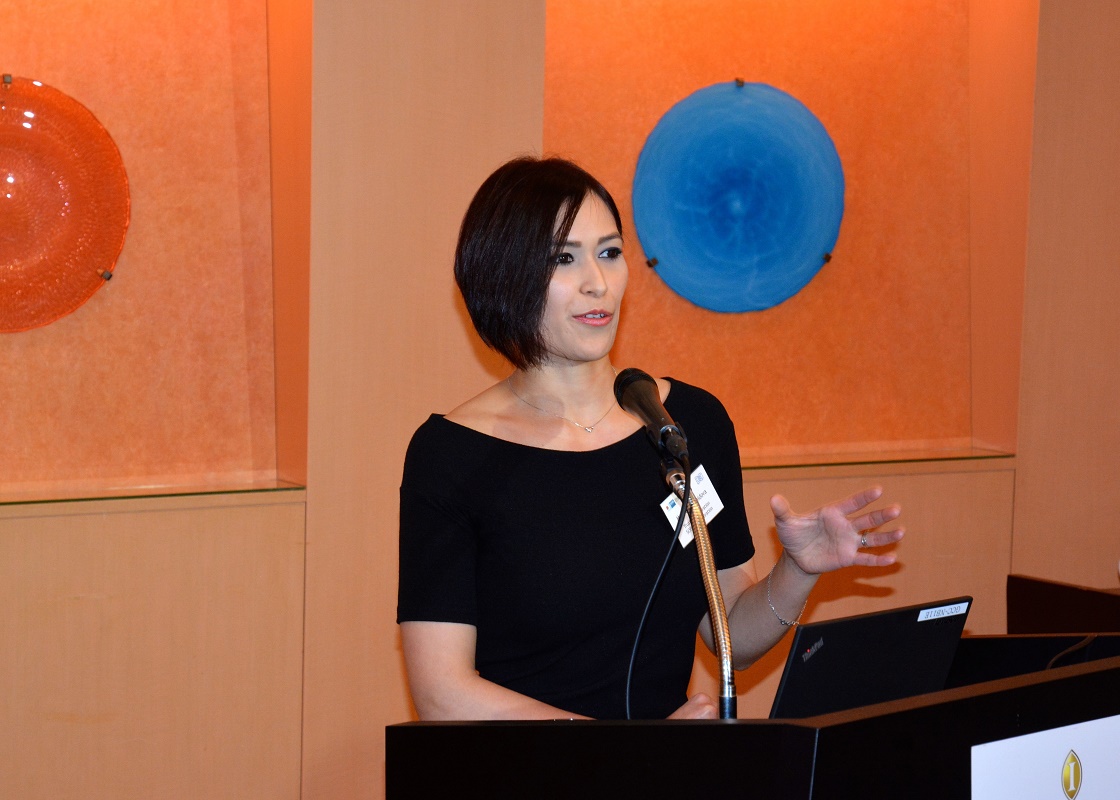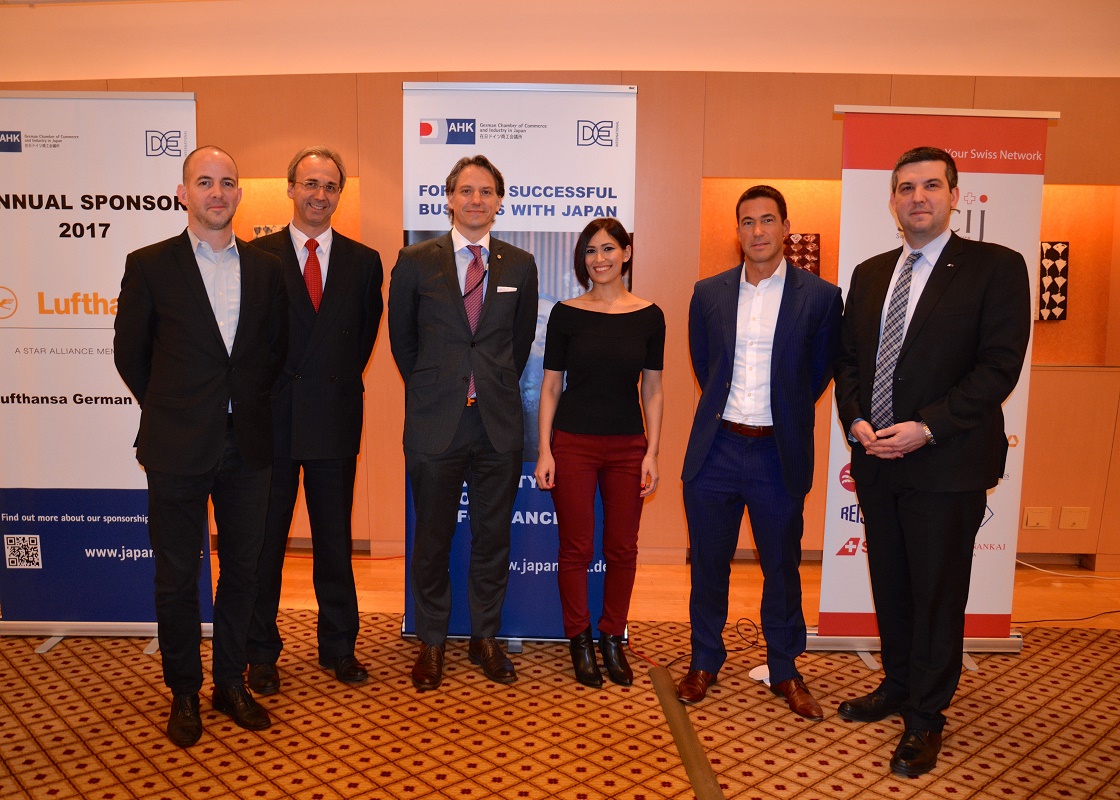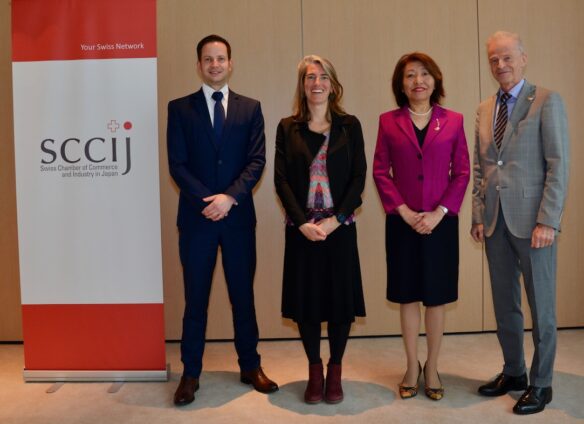Tokyo (SCCIJ) – Ms. Fariza Abidova from Uzbekistan, young founder of two startup companies in Japan, impressed almost 60 members and guests of the Swiss Chamber of Commerce in Japan (SCCIJ) and the German Chamber of Commerce and Industry in Japan (AHK Japan) with her talk about her experiences as a young foreign female entrepreneur. Ms. Abidova is the CEO & President of Trusted Corporation, established in 2016, and SOPHYS Corporation, established in 2010. At the joint luncheon of SCCIJ and AHK Japan, she was introduced by Mr. Dirk Hermans, Director of Advisory Services at Deloitte Touche Tohmatsu.
Two startups within six years
Ms. Abidova graduated with honors from Samarkand State Institute of Foreign Languages, majoring in English and Japanese linguistics. She won a scholarship of Japan’s Ministry of Education, Culture, Sports, Science and Technology to do research in Japan focused on cross-cultural communication and international relations.
Her first company SOPHYS provides business solutions to global Japanese companies regarding cross-cultural awareness, and practical business and communication skills necessary for a global business environment. Her second company Trusted is currently in the startup phase.
The B2B online platform makes it possible to find business partners without middlemen and to reach any company’s decision makers directly. Customers benefit from direct sales leads and interesting collaboration offers from abroad. It is now available for registration and membership and still completely free.

Joint luncheon speaker Ms. Fariza Abidova
Female, foreign, founder
In her appearance at the joint luncheon of SCCIJ and AHK Japan, Ms. Abidova talked about her entrepreneurial career in Japan. Here are – in her own words – the main experiences and lessons she learned and wanted to share.
Decision to quit – “After finishing university, I was working as a freelance translator for two years. To develop a product or a service you need time and money. Thus, I kept working freelance while starting my company so I could manage my schedule flexibly.”
Next step: Ideation – “It is easy to do market research nowadays thanks to the internet. But it is also really difficult to come up with something unique. So I ignored market research when I decided to develop seminars for employees which are not based on abstract lectures but on real life experiences. Instead of academic speakers, I invited CEOs from different countries my seminar participants could learn from. Such seminars are closer to real life which became my unique selling point.”
People – “I had to build a team for program development. I outsourced sales first to a very big company with 3,000 sales representatives. I thought this would work out very well. But there were two problems. This company was too big, so decision making took too much time. Also, the sales people were not used to sell seminars so I had to train them. From that, I learned my lesson and increased my partner companies to ten medium-sized companies which were faster and more flexible.”
Goals – “First, I made my goals on numbers only and dreamed of growing my business very quickly. But it took me two years to get the first paying customer. My lesson was that it is okay to make unrealistic goals but that I should appreciate small achievements. This experience helped me a lot in my second business. Now I am trying to be more flexible and to appreciate every small achievement.”
Branding – “As a startup company you have no track record and no branding. But I heard of Academy Hills in Roppongi Hills where famous professors hold seminars. So I went there and wanted to convince them that I would be allowed to hold my really practical seminar there for free. After all, I had famous foreign business people as guest speakers. I could not sleep the night before the meeting. It was my first pitch, I had to take some medicine, but it worked. They agreed right away. From there, I got really interesting partnership offers and I could develop my brand.”

Representatives of SCCIJ and AHK Japan with Ms. Fariza Abidova and Mr. Dirk Hermans, Director of Advisory Services at Deloitte Touche Tohmatsu (second from right) at joint luncheon
Customers – “I want to have repeat customers which gives your business stability. So I made 100 percent customization of my seminars for each client. By this, I built personal relationship with my clients as well. This takes time but it is a good investment for growth. If clients are really happy they don’t change vendor often.”
Money – “In the beginning, I saved money by working from home and manage the team online. We had no in-house sales team and I was running after big projects. But that was risky. Once, a project was postponed and I could almost not pay the salaries of my team members. So I started small projects and made an annual plan in advance in order to manage my finances more easily.”
Scaling – “Commitment changes everything. Also in my case, it was the commitment which made the difference. But one consequence was that my first business with the seminars became founder dependent. My clients wanted only me to deliver the seminars. Thus, the business was not scalable anymore. Over six years, I helped about 3,000 managers with my seminars. But I think this is a drop in the ocean. The impact is not so big. So I decided to focus on a new project which is more scalable.”
Mentality – “Doing business taught me so many things: how to be disciplined, how to constantly grow, I became better in human relationships. I learned how to believe in my own intuition which helped me to move on a lot. Networking is supposed to be important. But I learned that cutting relationships is also necessary. From the start, choose people that agree with you. This saves energy.”
New beginnings – “With the foreign speakers at my seminars I was giving the image that I have a strong network abroad. Thus, I was getting offers to join projects to expand business abroad. Many small and medium companies in Japan want to expand business abroad but they do not know how to find a trustful business partner. Trust is the main problem. This developed into the idea of setting up an online platform where tested companies can contact each other for cross-border business.”
Text and photos: Martin Fritz for SCCIJ





























